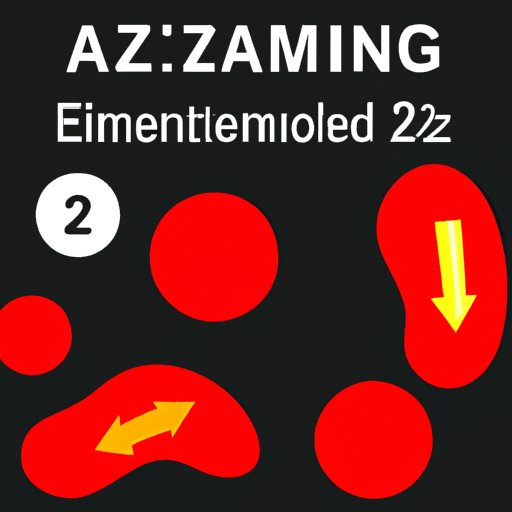
I. Introduction
Pernicious anemia is a type of vitamin B12 deficiency caused by the body’s inability to absorb enough vitamin B12 from the foods we eat. While there can be several reasons behind this, studies have found that autoimmune diseases like autoimmune gastritis and autoimmune thyroid diseases are significant contributors to pernicious anemia. In this article, we will explore the autoimmune component of pernicious anemia and help you understand its link to autoimmune diseases.
II. An in-depth look at the link between autoimmunity and pernicious anemia
Pernicious anemia is a type of autoimmune disease where the immune system starts producing antibodies that attack the body’s cells instead of fighting off infections. In the case of pernicious anemia, the antibodies target intrinsic factor (IF), a protein that combines with vitamin B12 in the stomach and later aids its absorption in the small intestine. The damage caused by IF antibodies to this crucial protein results in decreased vitamin B12 absorption and ultimately leads to pernicious anemia.
The effects of autoimmunity on the body’s ability to absorb vitamin B12 cannot be overstated. An advanced case of pernicious anemia can seriously dampen the production of red blood cells, affecting energy levels, cognitive agility, and overall mental and physical health.
III. The role of intrinsic factor autoantibodies in causing pernicious anemia
Intrinsic factor autoantibodies are antibodies that target the intrinsic factor protein, making it more challenging for vitamin B12 to be absorbed into the bloodstream. These antibodies not only damage intrinsic factor, but they can also lead to gastritis (stomach inflammation) and reduce the production of parietal cells. The loss of parietal cells reduces the production of stomach acid, which is required to initiate the vitamin B12 absorption process. As a result, intrinsic factor autoantibodies are the leading cause of pernicious anemia.
IV. Understanding the autoimmune component of pernicious anemia and its implications for treatment
Presently, the standard treatment for pernicious anemia involves the administration of vitamin B12 injections to bypass the digestive system’s absorption route. This treatment has proven to be effective in treating the symptoms of pernicious anemia to a great extent. However, it is critical to understand the autoimmune component of pernicious anemia, as it can have significant implications for treatment development.
Understanding the autoimmune component of pernicious anemia can guide scientists to develop new treatment options that target the root cause of the disease, which is the autoimmunity. Patients with autoimmune-induced pernicious anemia require personalized approaches to treatment to ensure that their underlying autoimmune condition is managed while also treating the anemia.
V. Delving into the connection between autoimmune gastritis and pernicious anemia
Autoimmune gastritis is a type of autoimmune disease where the immune system attacks the cells of the stomach lining that produce stomach acid and intrinsic factor. This results in reduced stomach acid and intrinsic factor production, leading to reduced vitamin B12 absorption and pernicious anemia. Autoimmune gastritis can often go unnoticed for several years, leading to untreated pernicious anemia.
It is essential to note that autoimmune gastritis is not the only autoimmune disease that can lead to pernicious anemia. About 5-10% of patients with autoimmune thyroid diseases like Hashimoto’s thyroiditis or Graves’ disease develop pernicious anemia, and autoimmune diseases like systemic lupus erythematosus and rheumatoid arthritis may also be linked to the development of pernicious anemia.
VI. A comprehensive guide to autoimmune diseases that can lead to pernicious anemia
As discussed earlier, several autoimmune diseases, including those affecting the thyroid gland, adrenal gland, and pancreas, can cause pernicious anemia. It is crucial for patients with autoimmune diseases to monitor their vitamin B12 levels and get them checked regularly for anemia to catch pernicious anemia early.
Other autoimmune diseases like celiac disease, Crohn’s disease, and ulcerative colitis can also lead to a deficiency of vitamin B12, although the mechanism might differ from the autoantibody-led pernicious anemia. Therefore, it is essential to consider pernicious anemia as a diagnosis for a vitamin B12 deficiency for patients with autoimmune diseases or with a history of gastrointestinal surgery that involves the removal of parts of the stomach, duodenum, or pancreas.
VII. Conclusion
Pernicious anemia is a type of vitamin B12 deficiency caused by the body’s inability to absorb enough vitamin B12 from dietary sources. Autoimmune diseases like autoimmune gastritis and autoimmune thyroid diseases are significant contributors to pernicious anemia. The autoimmune component of pernicious anemia is critical to understanding the underlying cause of the disease and for developing personalized treatment options. Patients with autoimmune diseases must monitor their vitamin B12 levels regularly and seek treatment early if they suspect pernicious anemia. With the right diagnosis and treatment, it is possible to alleviate the symptoms of pernicious anemia and manage the underlying autoimmune condition.





